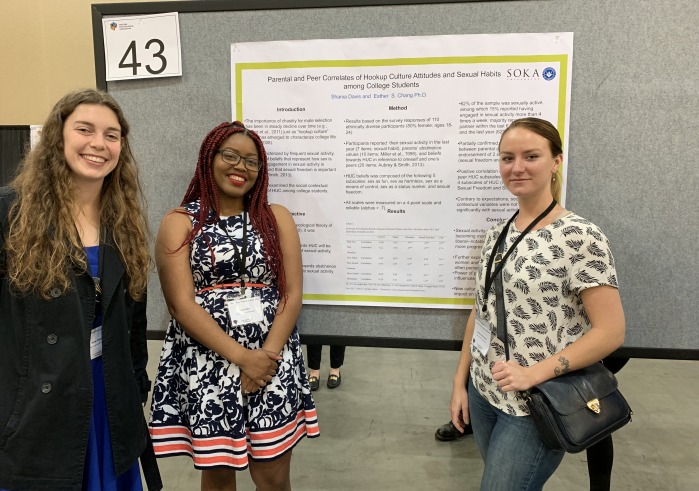Western Psychological Association Conference 2019

Emma Grant-Dreher, Class of 2019 (pictured on right)
On Friday, Shania and I arrived in the afternoon. We walked through the poster presentations happening at the time, asking questions and listening to the researchers’ descriptions of their projects. We then attended a talk about teaching the “iGeneration” (generation Z), and another talk about the investment model theory of relationships. The first topic was clearly well-researched but a bit under-stimulating and quite long, whereas the second one was much more interesting (perhaps because I had recently been learning about that theory in one of my classes). After the talks, I had the chance to present my own poster. I was a bit nervous, but overall felt respected by those who stopped by to ask questions; I was proud that I got to talk in detail about my capstone work, and excited that I was finally surrounded by people who are also obsessed with psychology. Overall, I most enjoyed being able to talk one-on-one with those presenting their posters. I felt that this give-and-take portion of the conference allowed me to better synthesize what I was interested in regarding psychology, as well as discover new areas of discipline and come up with some interesting questions. I also believe that, with the chance to present my own work, I found myself both becoming more confident in my abilities as a researcher and coming up with new questions to further the research I had done.
Shania Davis, Class of 2018 (pictured in center)
I found this year’s Western Psychological Association conference to be very enlightening. It was the first time I had a chance to participate in an event such as this, and I truly enjoyed feeling a small part of an incredibly big profession. Prior to my attendance, I had absolutely no idea what to expect. A fellow colleague and I talked about how nervous we were to present our studies in front of a group who were so knowledgeable about the process. We felt inadequate, as if we might not fit in or belong. However, once I walked through those doors, all of those feeling disappeared; I was among my peers. It was only when those feelings disappeared that I was able to truly enjoy myself. I heard so many unique student presentations, the most memorable being a three-part study on “catfishing.” I sat in on an incredible talk about teaching the “iGen” generation, received some shockingly devastating trends on the effects of smartphones and was presented with teaching solutions as to how to accommodate this upcoming generation. Finally, when I gave my presentation the following day, I was surprised to see how many people were generally interested in my research; more importantly, I was surprised about how comfortable I was speaking with them. I found those conversations to be the most memorable—not only did those conversations provide ways for me to expand this research in the future, but validated the importance of my research and its large impact on my community. The students who came and spoke to me were all part of my generation; they have all experienced this phenomenon and felt that it was a topic of vital importance. As a result, I feel more confident than ever that this is the profession to which I truly belong.
